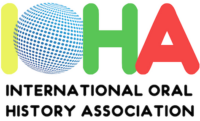
Report from Greece for the IOHA website
By Riki Van Boeschoten
From 18-20 May 2018 the a multi-cultural town close to the Turkish border. It is home to the Democritus University of Thrace, which hosted the event, and a substantial Muslim minority. The topic of the conference was “Identities and Otherness in Periods of Crisis”. Our two guest speakers came from Turkey: Arzu Öztürkmen spoke about the intellectual journey which led her from folklore studies to oral history and Şenay Özden gave us a harrowing account of the situation of Syrian refugees in Turkey, focusing in particular on women’s life stories. Another important contribution were the presentations by two Yezidi scholars, Ali Simoqy and Bayar Mustafa, who talked to us on skype from Iraq, as they had been unable to make it to Greece. Bayar Mustafa focused on the massacre of Yezidis by the Islamic State in 2014 and Ali Simoqy gave us more background by focusing on the oral traditions he had been able to record from the elderly survivors of the massacre.
The warm and open climate of the conference facilitated lively discussions and confirmed the democratic and collaborative character of oral history. Apart from established academics, many papers were presented by postgraduate students, independent researchers, school teachers, members of local oral history groups and representatives of social movements. The conference kicked off with four papers by academics on the current economic-cum-social crisis in Greece and ended with a panel with members of the “Social Laboratory of Thessaloniki” which combines social activism with political and academic reflexivity. The conference ended –appropriately- with a middle-aged homeless man from Thessaloniki, presenting his reflexive life story.
During the three days of the conference we also heard about many other crises of the past and the present, and how oral testimonies can help us understand the ruptures and continuities in people’s lives: war and civil war, migration movements, settlement in refugee camps, relations between ethnic or religious minorities and the state. Some papers focused more on methodological issues: how to analyze the impact of trauma on intersubjectivity, the need for retrospective reflexivity on interview material collected during periods of crisis, the role of “biographical work” in interviews with individuals coming out of drug addiction.
A very positive development was the interdisciplinary encounter between oral history and other disciplines or fields, such as media studies, digital storytelling, museum studies or public history. One very interesting example was the amazing work done by Georgia Saridaki in empowering young women with learning disabilities, female students and refugee women through digital storytelling. By encouraging them to produce in groups short three-minute videos about their own life stories, gradually a safe space emerged for narrating the self and communicating with each other. This in turn gave the participants new strengths to face the future. Another example was the initiative to create a “People’s University” in the town of Elefsina, a town close to Athens known for its ancient past but now suffering from de-industrialization, unemployment and pollution. After attending a hands-on course about “creative writing” and being encouraged to tell their life stories, people started to feel again connected to their town and to each other. Amazing stories emerged, interweaving ancient myths with a present marked by the crisis, connecting past migrations with today’s refugees. This material was then reworked into a theatre performance to give back to the city a renewed sense of self. Indeed a remarkable achievement, made possible through the close cooperation between oral history, education and drama.
This close connection between theatre, narration and therapeutic processes also marked the closure of this conference with a performance of the Playback Theatre of Thessaloniki. Participants were invited to tell short stories about themselves, about their identities or about a painful or happy experience. These stories were then performed by the actors, who, with very simple means, were able to get right to the core of the story. The performance left a profound impact to all those who witnessed it. To conclude, with this multi-faceted conference, held in a remote area of Greece, oral history certainly showed its potential not only to record history but to engage actively with society and its challenges.
